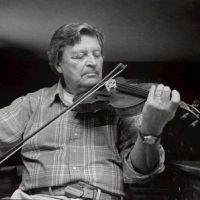
Tommy Hunter
Thomas Hunter made a lifetime pursuit of mastering and preserving the traditional fiddle tunes of Western North Carolina. A fiddler of near legendary regard, his sensitive and melodic style and his ability to play the difficult hornpipe tunes were much admired and emulated by fellow musicians.
Born in 1919 in Madison County, young Tommy loved to listen to the expert fiddling of his grandfather and uncle when they gathered to make music on cold winter nights. Soon he began to borrow his grandfather’s instrument on the sly. “I was always careful to put it back just exactly the way I found it so he wouldn’t suspect somebody had fooled with it,” he said. “I did this for some time and got to where I could play a little tune.”
It wasn’t long before he began to play music with family members, and by age 12 he was performing at square dances and fiddle contests with a family group. A couple of years later he played lead fiddle in the Windy Gap Ramblers, a string band much sought after for school and community festivities. His reputation as a fiddler spread quickly.
From 1939 until he left for service in World War II, Hunter played professionally with Zeke and Wiley Morris, then popular entertainers on WWNC in Asheville. While overseas he often entertained the troops, and in Ireland he recorded for the BBC. He returned to Madison County after the War and resumed his music-making with his family. In the late 1950s he formed Tommy Hunter’s Carolina String Band with his sister Nan, her husband George Fisher, and Obray Ramsey.
Beginning in the early 1970s, he began his long association with banjoist Carroll Best, forming a group named the Hornpipers, and he later made occasional appearances with the Carroll Best String Band. Through the ’70s and early ’80s, he performed often at festivals, was featured on several commercial recordings and television programs, and was recognized for his contributions to Appalachian music by the Smithsonian Institution and the Appalachian Consortium. In 1989, Tommy Hunter was among the first group of traditional artists to receive the North Carolina Folk Heritage Award.


